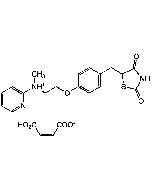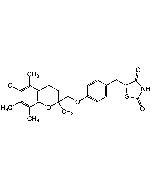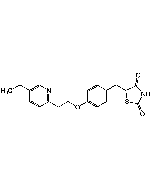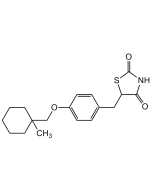Cookie Policy: This site uses cookies to improve your experience. You can find out more about our use of cookies in our Privacy Policy. By continuing to browse this site you agree to our use of cookies.
AdipoGen Life Sciences
WY-14643
As low as
30
CHF
CHF 30.00
In stock
Only %1 left
AG-CR1-3566-M01010 mgCHF 30.00
AG-CR1-3566-M05050 mgCHF 80.00
AG-CR1-3566-M250250 mgCHF 240.00
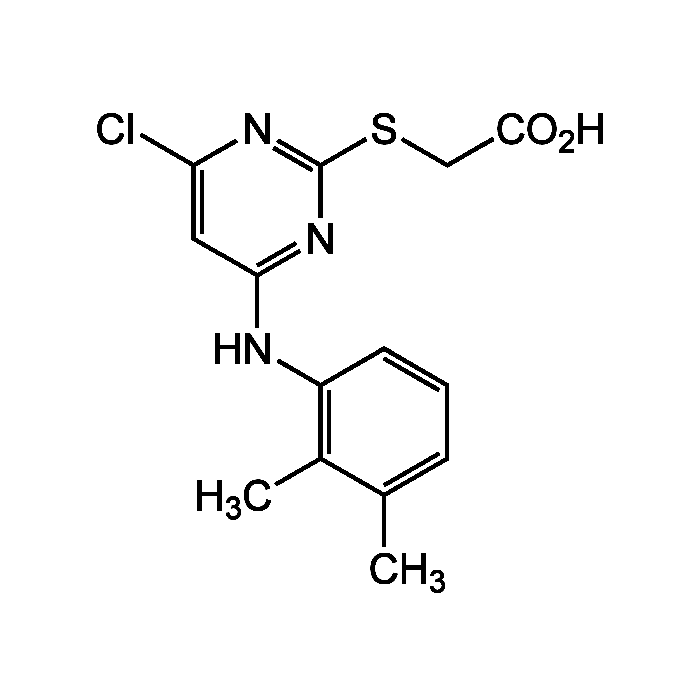
| Product Details | |
|---|---|
| Synonyms | Pirinixic acid; NSC 310038; BRN 0759945; ((4-Chloro-6-((2,3-dimethylphenyl)amino)-2-pyrimidinyl)thio) acetic acid |
| Product Type | Chemical |
| Properties | |
| Formula |
C14H14ClN3O2S |
| MW | 323.8 |
| CAS | 50892-23-4 |
| RTECS | AG2915000 |
| Purity Chemicals | ≥98% |
| Appearance | Off-white solid. |
| Solubility | Soluble in ethanol, DMSO, dimethyl formamide or PBS (pH 7.2). |
| InChi Key | NSHPHXHGRHSMIK-WAXGXQFOSA-N |
| Smiles | CC1=CC=CC(NC2=NC(SCC(O)=O)=NC(Cl)=C2)=C1C |
| Shipping and Handling | |
| Shipping | AMBIENT |
| Short Term Storage | +4°C |
| Long Term Storage | -20°C |
| Use/Stability | Stable for at least 2 years after receipt when stored at -20°C. |
| Documents | |
| MSDS |
 Download PDF Download PDF |
| Product Specification Sheet | |
| Datasheet |
 Download PDF Download PDF |
Description
- Potent peroxisome proliferator-activated receptor (PPARα) activator [1, 2, 7, 9]. Activates also PPARγ [4, 7] but not PPARδ [8].
- Potent anti-hypercholesterolemic agent [1].
- Hypolipidemic compound. Lipogenesis inducer [2, 10].
- Tumor promoter [2, 3, 5, 15].
- Causes increased cell proliferation and decreased apoptosis [5].
- Anti-inflammatory. Inhibits NF-κB transcriptional activity and decreases the inflammatory response by reducing the production of inflammatory cytokines (TNF-α, IL1β). Reduces oxidative stress [6, 7, 12, 13].
- Increases fatty acid oxidation [11].
- Directly affects insulin signaling. Increases glucose uptake [12].
- Enhancer of ethanol metabolism.
- Reviews [5, 11, 14].
Product References
- A potent antihypercholesterolemic agent: (4-chloro-6-(2,3-xylidino)-2-pyrimidinylthio) acetic acid (Wy-14643): A.A. Santilli, et al.; Experientia 30, 1110 (1974)
- The hepatic effects of hypolipidemic drugs (clofibrate, nafenopin, tibric acid, and Wy-14,643) on hepatic peroxisomes and peroxisome-associated enzymes: D.E. Moody & J.K. Reddy; Am. J. Pathol. 90, 435 (1978)
- Peroxisome proliferation and hepatocarcinogenesis: M.S. Rao & J.K. Reddy; Carcinogenesis 8, 631 (1987)
- Identification of a new member of the steroid hormone receptor superfamily that is activated by a peroxisome proliferator and fatty acids: A. Schmidt, et al.; Mol. Endocrinol. 6, 1634 (1992)
- Non-genotoxic hepatocarcinogenesis: suppression of apoptosis by peroxisome proliferators: R.A. Roberts; Ann. N. Y. Acad. Sci. 804, 588 (1996) (Review)
- The PPARα-leukotriene B4 pathway to inflammation control: P.R. Devchand, et al.; Nature 384, 39 (1996)
- Peroxisome proliferator-activated receptors a and g are activated by indomethacin and other non-steroidal anti-inflammatory drugs: J.M. Lehmann, et al.; J. Biol. Chem. 272, 3406 (1997)
- Hypolipidemic drugs, polyunsaturated fatty acids, and eicosanoids are ligands for peroxisome proliferator-activated receptors alpha and delta: B.M. Forman, et al.; PNAS 94, 4312 (1997)
- Activation of human aortic smooth-muscle cells is inhibited by PPARα but not by PPARγ activators: B. Staels, et al.; Nature 393, 790 (1998)
- Influence of peroxisome proliferator-activated receptor alpha agonists on the intracellular turnover and secretion of apolipoprotein (Apo) B-100 and ApoB-48: D. Lindén, et al.; J. Biol. Chem. 277, 23044 (2002)
- Peroxisome proliferator-activated receptor alpha (PPARalpha) signaling in the gene regulatory control of energy metabolism in the normal and diseased heart: B.N. Finck & D.P. Kelly; J. Mol. Cell Cardiol. 34, 1249 (2002) (Review)
- WY-14643 and 9- cis-retinoic acid induce IRS-2/PI 3-kinase signalling pathway and increase glucose transport in human skeletal muscle cells: differential effect in myotubes from healthy subjects and Type 2 diabetic patients: K. Bouzakri, et al.; Diabetologia 47, 1314 (2004)
- Oxidative stress and inflammatory response evoked by transient cerebral ischemia/reperfusion: effects of the PPAR-alpha agonist WY14643: M. Collino, et al.; Free Radic. Biol. Med. 41, 579 (2006)
- Cardiovascular actions of the peroxisome proliferator-activated receptor-alpha (PPARalpha) agonist Wy14,643: P. Zahradka; Cardiovasc. Drug Rev. 25, 99 (2007) (Review)
- PPARalpha: mechanism of species differences and hepatocarcinogenesis of peroxisome proliferators; F.J. Gonzalez & Y.M. Shah; Toxicology 246, 2 (2008)
- PPARα agonist WY-14,643 enhances ethanol metabolism in mice: Role of catalase: X. Chen, et al.; Free Radic. Biol. Med. 169, 283 (2021)






